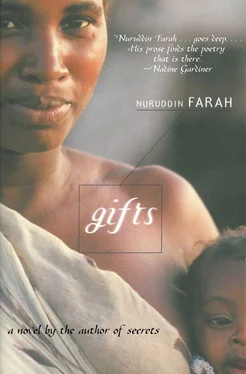Nuruddin Farah - Gifts
Здесь есть возможность читать онлайн «Nuruddin Farah - Gifts» весь текст электронной книги совершенно бесплатно (целиком полную версию без сокращений). В некоторых случаях можно слушать аудио, скачать через торрент в формате fb2 и присутствует краткое содержание. Год выпуска: 2011, Издательство: Arcade Publishing, Жанр: Современная проза, на английском языке. Описание произведения, (предисловие) а так же отзывы посетителей доступны на портале библиотеки ЛибКат.
- Название:Gifts
- Автор:
- Издательство:Arcade Publishing
- Жанр:
- Год:2011
- ISBN:нет данных
- Рейтинг книги:3 / 5. Голосов: 1
-
Избранное:Добавить в избранное
- Отзывы:
-
Ваша оценка:
- 60
- 1
- 2
- 3
- 4
- 5
Gifts: краткое содержание, описание и аннотация
Предлагаем к чтению аннотацию, описание, краткое содержание или предисловие (зависит от того, что написал сам автор книги «Gifts»). Если вы не нашли необходимую информацию о книге — напишите в комментариях, мы постараемся отыскать её.
Gifts — читать онлайн бесплатно полную книгу (весь текст) целиком
Ниже представлен текст книги, разбитый по страницам. Система сохранения места последней прочитанной страницы, позволяет с удобством читать онлайн бесплатно книгу «Gifts», без необходимости каждый раз заново искать на чём Вы остановились. Поставьте закладку, и сможете в любой момент перейти на страницу, на которой закончили чтение.
Интервал:
Закладка:
By then, she had eased the vehicle into total submission, and was clearly in a light-hearted euphoria, winged like a griffin. She pressed the accelerator, speeding up more and more. She did this to shorten the distance existing not between her body and Bosaaso’s but between herself and her brother, Abshir. Only hours separated them and she wished to spend these in self-abandonment, in Bosaaso’s house and company. She wanted several questions about Bosaaso out of the way before she embraced Abshir.
To enrich itself, her memory returned to that ambiguous zone between myth and religion, where griffin-like b uraaqs rubbed shoulders with jinns eaves-dropping at the gates of heaven; where shooting-stars were said to be aimed at the latter to discourage them; where bored women engage jinns in illicit love affairs; where jinns, out of wickedness, mounted sentry duty at the door to Zubair’s sight.
Tonight, Duniya had a deep-seated wish to give herself to him, a wish that had taken days to mature. She was glad he hadn’t rushed her. Now the timing was right, and its suddenness lent her decision more power, like unexpected thunder in a season of awaited rains. She wanted to know what he was like in bed; if he snored; what were his quirks; was he fussy about which side of the bed he slept on; was he in a foul mood when he woke in the mornings?
From the way he stirred, she sensed he wished to say something. “Yes?”
“We’ll have time to talk,” she heard, and yet he appeared dead from worry, pale almost, the blood drained out of him. She touched his hand which felt cold, lifeless.
“Say it if it can’t wait until we reach your place,” she said.
He hesitated. “It’s just…” but he hadn’t the courage to finish whatever it was he had intended to say.
She slowed down. He would have to give her directions from then on. But he told her to turn left when he meant her to go to the right. She decided he had a terrible sense of direction, which she attributed to his having lived in a sign-posted city where one had maps and didn’t depend on one’s instinctive sense of direction. She didn’t understand what he was talking about, but she let him talk on and on, because it did him good, reducing the tension considerably. But what exactly did he want to say?
A woman who has brought up three children isn’t easily surprised; she can see anxiety on her children’s faces, knows what they want long before they speak. As a nurse, she listened to a great many silly questions coming from otherwise intelligent people who, because they’re unwell, lose the ability to use their heads wisely.
“Do you know how long Abshir is staying in Mogadiscio?” he asked.
“I’ve no idea,” she replied.
He is a worrier, she thought. A heart-eating, self-questioning man, with little confidence in himself. He is possibly the kind of man who gets up at day-break to worry about whether or not he will keep his midday appointments.
She was glad when they got to his gate, in front of which she braked. There were lights on in the upper floor of the house, and she could see a balcony badly in need of repair. Was that the balcony from which Yussur and the baby had dropped to their deaths? Duniya, with the engine still running, came out of the car, saying to him, “You drive it in yourself.”
A night watchman, from the River People, showed her the way with a torch, indicating to her the small side gate by which pedestrians entered Bosaaso’s house. But when he had parked his car in its shelter and joined her, in fact, just as he had taken her hand to lead her inside, there was a power cut whose suddenness made her start. The night watchman’s faint flashlight provided enough light for them to see the steps to the main door.
“I have a generator and enough diesel to run it,” he said.
“If the rest of the district has no light, why should we?”
“Fair enough,” he said.
As she entered the door which he had held open for her, Duniya saw her shadow severing, in two halves, the moonlight looking in the doorway She stepped on the tail of her own shadow, as if it were a doormat on which she was meant to wipe her shoes clean. Walking further in, she sensed that the house had something spiritless about it. She walked straight ahead, but stood out of Bosaaso’s way, imagining that he would want to look for a box of matches or candles or to pull open curtains or windows. An instant later, however, she could hear the french windows being dragged open scratchily, and he was saying, “There is an armchair here. Please come.”
“In a moment,” she said.
“Or would you rather we sit in the dark looking out on the moonlight?”
They met midway and embraced. The night was gauze-thin and she had little difficulty penetrating the greyish membrane with which it was wrapped. The moon guided her towards itself, where it occupied the centre of a clearing, and the clouds had stayed back, like a well-behaved crowd of onlookers, giving space and limelight to the principal actor the occasion had crowned. She loved the silence, loved the half-dark, she loved the two of them on their feet, chest to chest, with neither saying anything. Then she lost sight of the moon. But had it gone? She counted up to thirteen, as though it were a lighthouse whose flashing could be timed. Then the outside world began interfering with their inner quietness and peace.
The night watchman called Bosaaso’s name.
“Shall I answer?” he said, in a whisper.
Letting go of him, she said, “You already have.”
His breath was charged with tension, like a frightened lizard’s throat. Now that they fell apart, each cast a separate shadow, his shorter than hers. He was clearly upset, but didn’t want to shout at the night watchman, poor fellow. He was angry with himself. His voice carried in it a multitude of mixed emotions when he said, “What is it you want?”
The night watchman stood to the side of the door which Bosaaso had opened. Heard but not seen, he delivered his message: “Waaberi, your sister-in-law, has been here a number of times.”
Bosaaso was tempted to correct this fool of a night watchman, by reminding him that Waaberi was his former sister-in-law. But he let that pass, in deference to Duniya.
“What did she want, did she tell you?”
“She only said she needed to see you urgently.”
“Did she say what about?”
“And there was that man with her.”
“Whatman?”
The night watchman had a Baidoan Somali accent and this began to jar on Bosaaso. He might have lost his self-control had not Duniya come and taken his hand, to kiss it.
“Do you know the name of the man who came with Waaberi?” he asked.
“The one with the car shinier than moonlight,” said the night watchman.
Bosaaso described Kaahin.
“That’s him.”
“When did they say they will come back?”
“Some time tonight.”
Bosaaso’s voice, when he next spoke, assumed two tones, belonging to two different modes of his being. The first half of the statement was followed by a pause, long enough for him to return Duniya’s kiss. He said, “If either Waaberi or Kaahin comes here tonight … my instructions are not to allow either to disturb us.”
“What if they ask when they can see you or where?” said the night watchman.
“Tell them I’ll go and see them myself,” Bosaaso said.
When the door closed and they were in the dark, they listened to the receding footsteps of the night watchman.
She said, “You are so impeccably polite, it puts me to shame, when I think of my rages, fights and tempers. Are we attracted to each other because we’re so different?”
“We have many things in common,” he said.
“Of course we do,” she said, “but it wouldn’t upset me at all if you showed your anger now and then.”
Читать дальшеИнтервал:
Закладка:
Похожие книги на «Gifts»
Представляем Вашему вниманию похожие книги на «Gifts» списком для выбора. Мы отобрали схожую по названию и смыслу литературу в надежде предоставить читателям больше вариантов отыскать новые, интересные, ещё непрочитанные произведения.
Обсуждение, отзывы о книге «Gifts» и просто собственные мнения читателей. Оставьте ваши комментарии, напишите, что Вы думаете о произведении, его смысле или главных героях. Укажите что конкретно понравилось, а что нет, и почему Вы так считаете.











